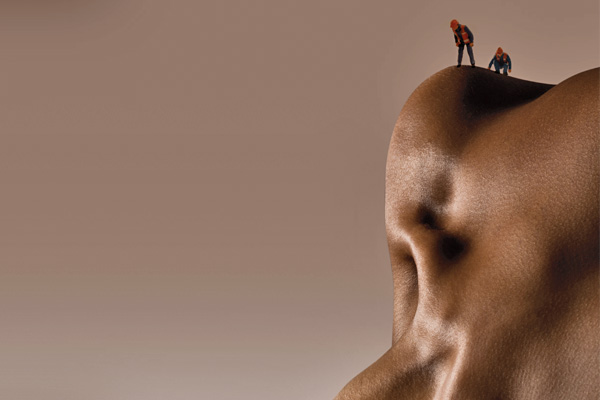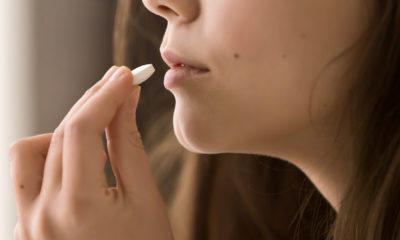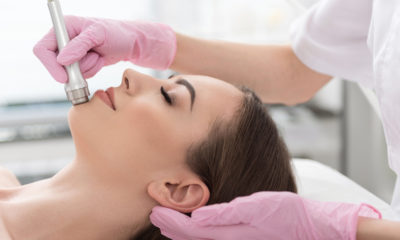Beauty
Everything You Need To Know About Your Skin
Aside from a set of fabulous muscles, there might be something else you have in common with Wonder Woman – her skin. OK, maybe you couldn’t take a bullet and see the injury heal in the next few hours, but your skin is pretty incredible. It has the strength to protect you from pollutants, viruses, bacteria, and injury; it provides a barrier to the damage that can be wreaked by wind, sun and snow; it helps you feel cool during a hardcore hot bikram yoga session or warm on a morning run when it’s so cold your heart pumps harder than ever to keep your blood circulating.
In fact, the skin’s functions are so essential and unique to your body, it’s considered an organ just like your heart or lungs. Amazing though it is, just like Wonder Woman, your skin has its enemies. Figure out how to outsmart them to give your skin the superpowers it’s intended to have.
What harms our skin?
The sun is usually the first thing people think of when they consider damaging influences on our skin, and it is. But some healthy activities also trigger an assault. Consider running, where your skin is likely to undergo friction, cold or heat, moisture, injury, athlete’s foot, and blisters. Cycling, lifting weights, even yoga – all of these activities put your skin under extra strain. Even the simple act of wearing shoes demands a lot of your skin.
Skin provides the strongest barrier to germs reaching your bloodstream, especially while training. But, despite your skin harboring hundreds of different types of bacteria – some good, some bad ¬ your skin prevents them from gaining access to your bloodstream. Even if you suffer a minor cut, it won’t get through because healthy skin is made up of multiple layers. Of course, some bacteria and viruses do manage to invade – such as staphylococcus and streptococcus, and if your skin is damaged it’s also possible for bacteria and viruses to enter your bloodstream. Generally speaking, your skin is an incredible barrier.
– RELATED: 6 Tips For A Truly Flawless Complexion –
Lotions and potions
How good, then, is it at absorbing all the good stuff you put on it? Smoother lines, a more even skin tone and fresh, plump skin texture are just some of the benefits you hope to see from your expensive face cream. But if you take the idea of absorption one step further, you’ll realize if those ingredients can get past your skin, it could mean they appear in your bloodstream – and who wants face cream floating around their veins?
So here’s what really goes on. Skin consists of three layer groups: the outer layer – the stratum corneum – contains dead skin cells and waxy substances to form a good barrier. The middle layers (the stratum lucidum and the stratum granulosum) produces keratin, the protein that protects cells from damage and stress. Finally, the lowest layers (stratum spinosum and stratum basale) produce and push new cells upwards.
“The outer layer of skin is bathed in oily sebum, which repels water,” says Margaret Weeds, skin expert for Odylique. “This means your skin doesn’t absorb water like a sponge, and the oil helps maintain a natural barrier against irritants. This oil also prevents the moisture within the lower layers of skin from evaporating, helping to keep you smooth.”
So how does a cream or moisturizer work? Cosmetics companies blend oil and water to make it oil and water-friendly, as this kind of cream can get deeper within the skin. When an ingredient penetrates, it enters one of the middle or lower skin layers. There, it can help make your skin look plumper and less wrinkled after training. If an ingredient is fully absorbed, it bypasses the final lower layer and enters your bloodstream, but some toxins or substances that arrive via the skin in this way will simply be shown the door by our body’s excellent filtering systems – the kidneys and liver.

Is it safe?
The question of whether these creams and their component ingredients reach your bloodstream is tricky, and it’s also contentious because while manufacturers want their products to be absorbed to show benefits on your skin, the effects of absorption by your body aren’t fully known… yet. Some substances are too big, molecularly, to penetrate or be absorbed fully by the skin. Others are metabolized before they reach the bloodstream; some get neutralized, but others can become more dangerous and more toxic once they react with enzymes.
Furthermore, your individual skin composition will play a part in how you absorb substances via your skin, as will the weather, how thick the skin is where you apply it, the clothes you wear and even your style of training. If you go for a run, jump in a cold pool, have a sauna then a cold shower, then apply cream, it’s highly likely your skin will absorb a lot more than if you just did a light lifting session. You’ve increased blood flow around your body, which includes your skin, and so the travel time and route will be altered. If you’ve regularly used a cream or lotion, then found it to cause a reaction or sensitivity after working out, it could be your body is absorbing more of the substance or it’s penetrating a layer that it wouldn’t otherwise.
The final word
So, you’re probably thinking: what can I apply that will help protect me? First, avoid stripping off the protective outer layer of skin. Drying soaps and exfoliating too often or too roughly can harm the oily hardened part that prevents bad stuff from entering. That also means avoiding friction while working out, so wear snug-fitting clothing, use Vaseline in areas where you sweat and experience friction, and look for clothing with smooth seams (especially underwear). And consider why you need to put anything on your skin at all.
Do you need to moisturize daily? Research from Uppsala University, Sweden, indicates regular moisturizing of healthy normal skin, can make it drier once its application is stopped.
Finally, do your own research. Don’t be sucked in by the hard sell on how this or that substance will transform your skin – and don’t take your best friend/mom/favorite celebrity’s word for it, either. Listen to, or read, advice from others about skincare, then make up your own mind based on your unique skin type, individual habits and lifestyle factors. Once you’ve figured that out, your skin will feel softer, more elastic, smoother – and although it still won’t be able to repel a bullet, it will be better at fighting off viruses and bacteria and faster-healing after injury, too.




















